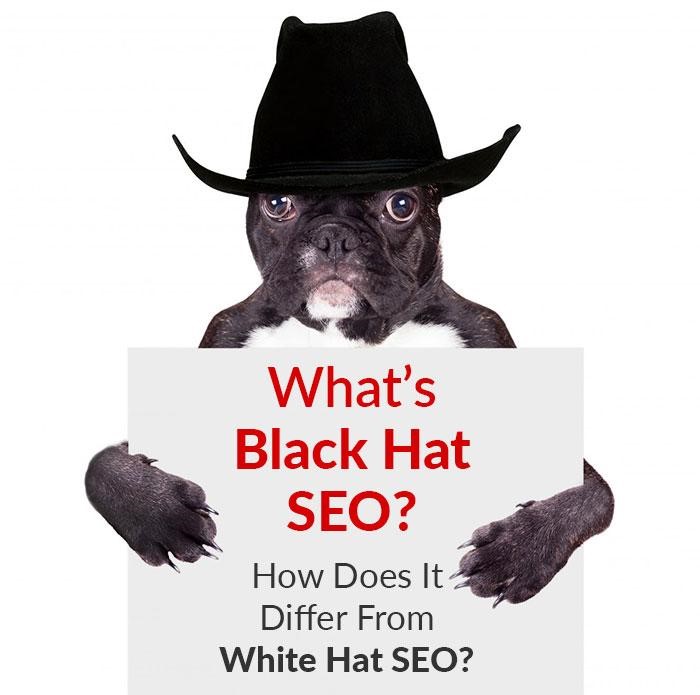Picture this opening scene:
You slump into your desk chair after a brutal meeting. You need to bring in leads and you need them fast. You’ve heard about some “off-the-record” internet marketing tricks that promise fast rankings and traffic, but you aren’t sure if they’re ethical or legitimate.
You look around the office. Nobody’s watching… and in all reality nobody would probably care. What’s the harm in trying, you ask yourself.
Sound familiar?
This scenario is so common that there’s even a term for it: black hat SEO.
The terms “black hat” and “white hat,” as they relate to search engine optimization (SEO), originated from those classic Western movies where the characters were distinguished by which color cowboy hat they wore — the villains always wore black hats while the hero wore a white hat.
So the question is:
Which character will you choose to be: the damsel-saving hero, or the gun-slinging outlaw?
In this article, you’ll learn:
- The definition of black hat SEO and common tactics
- The definition of white hat SEO and common tactics
- Why black hat SEO should be avoided at all costs
…and ACTION!
What is Black Hat SEO?

Black hat SEO is considered any search engine marketing (SEM) technique that falls outside of the approved best practices of search engines like Google, Yahoo and Bing. These are a set of practices that are used to cheat and violate a search engine’s terms of service with the aim of increasing a site or page’s rankings in a search engine results page (SERP).
As Search Engine Journal writes, SEOs who engage in black hat tactics are “the gun-slinging outlaws of the internet because they rely on rule-breaking techniques to earn higher rankings.”
Black Hat SEO Techniques
What exactly are black hat SEO tactics? What are signs of black hat SEO?
Some common black hat SEO marketing schemes and tricks include:
- Keyword stuffing – purposefully repeating keywords over and over again – usually at the bottom of a page in very small text – in order to get the page to rank.
- Invisible text – creating text with the same (or near identical) color of the page’s background so that visitors can’t see any words but the search engines find keywords.
- Selling links – relying on paid links that clearly have nothing to do with each other or your business.
- Hidden links – links that are purposefully obscured from a visitor’s view or contained in a 1×1-pixel image, strategically placed to direct the search engine to an unrelated site.
- Doorway pages – creating large numbers of low-quality pages with the sole purpose of getting the site to rank well for as many keywords as possible.
- Meta/Javascript redirects – building a keyword-rich page designed to rank the site high in the search engines, then redirecting a visitor to a more suitable page for real people when a person clicks on the link in the search results.
- Duplicate content – blatantly copying massive chunks of your website’s content verbatim from other sites.
- IP cloaking – serving one site/page to human visitors and a different site/page to search engine spiders.
Click on the link to read about these and other black hat SEO tactics as well as how to avoid the Google penalty box.
What is White Hat SEO?

White hat SEO, on the other hand, is — yep, you guessed it — the opposite of black hat SEO in that it uses optimization strategies, tactics and techniques that are focused on the human experience rather than tricking search engines. White hat SEOs seek to achieve high rankings and traffic by completely following search engine rules, policies and best practices.
“For example, a website that is optimized for search engines, yet focuses on relevancy and organic ranking is considered to be optimized using White Hat SEO practices,” according to Webopedia. “White Hat SEO is more frequently used by those who intend to make a long-term investment on their website. (Also called Ethical SEO.)”
White Hat SEO Techniques
Being the SEO hero – rather than the black hat villain – is as simple as following these white hat strategies:
- Mobile-first – making your entire site mobile responsive and your pages easily accessible to mobile search results.
- Local SEO – optimizing your website for local search (TIP: Start by completing a Google My Business profile for your business if you haven’t already).
- User experience (UX) – writing clean code and focus on providing a good user experience for your visitors.
- Keyword research – using keyword tools to develop rich content that incorporates contextually relevant words and phrases that your target audience use when searching.
- Quality content – producing useful, relevant content by identifying the right keywords and engaging/delighting/informing your target audience.
- Schema – using Schema.org to create an enhanced description that appears in the search results (commonly known as rich snippets).
- Link building – earning the right kinds of links that have relevance to your site.
- Navigation – organizing your pages based on keyword hierarchy and research.
- Meta tags – using descriptive, keyword rich meta tags (title tags, description tags, image alt, etc.) in your website content.
Why is Black Hat SEO Bad?
Once you understand the differences between black hat and white hat SEO, inevitably the next question is how and why black hat SEO is negative for your business.
After all, there isn’t any law dictating how SEO may or may not be managed. If it allows you to take a quick shortcut to rankings and traffic so that you can outperform your competitors, then who cares if Google doesn’t like how you got there, right? Is it really so bad?
You certainly wouldn’t be the first person to fall into this trap, but we’re here to plead with you now to steer clear of black hat SEO altogether.
Here are three reasons why:
- Google changes its algorithms all the time. Tactics like keyword stuffing, doorway pages, hidden links and others all used to be standard SEO techniques – until the search engines decided this was black hat. From that moment on, websites caught using these techniques were de-indexed. Each year, Google changes its search algorithm somewhere around 500-600 times (1-2 updates per day). If you choose to engage in black hat SEO, keep in mind that it’s probably only a matter of time before Google adjusts its algorithm accordingly and it negatively impacts your site.
- Black hat is a short-term gain. Black hat SEO can work well for a while – until you get caught by the search engines. In the short-term, you can gain rapid search rankings; however, in the long-term, your site will suffer when it gets penalized. Don’t lose sight of the forest for the trees.
- The risk is too great. The reality is, black hat SEO can be a huge risk. Don’t just take our word for it. Here’s some wisdom from WordStream: “Consider all the work that goes into your website and then think about what it would be like to be banned from the internet’s most commonly used search engine. What’s worse, once you’re banned from Google, there is no guarantee that they will ever re-list you. A lifetime ban from Google would have tremendous consequences.” So ask yourself: Is it really worth the risk?
The End
In conclusion, we’ll let the famous American Western movie star John Wayne weigh in on this important topic:
Well said, John.
Whether you manage your business’s own SEO or you’re looking to hire an SEO company, don’t make the mistake of believing that black hat SEO techniques will get you the sustained, long-term benefits you desire.
Remember that in those classic Western films, it’s the hero – not the villain – that always wins.
Roll the credits.
What’s your opinion on black hat SEO: not a big deal or should be avoided at all costs?
We’re eager to hear from you in the comments below, or via Facebook.



Filip Zafirovski - Niksto says
Great article Lance!
Can you imagine a scenario where you would prefer black hat SEO over white hat seo?
Lisa Banks says
Lance, nice summary and definitions! I’d like to think that in this day and age black hat tactics would be long gone, but it seems not so. The trouble may be that website owners, who are often business people first, can have a hard time knowing what’s what, and have to simply trust their SEO company. This overview helps point out why it pays to know exactly what they’re doing on your behalf.
Parichatra Reuning says
Hey there…I do think Black Hat SEO is a good thing (as long as Google doesn’t find out and burn you..)…OH..WAIT..I didn’t mean to say that 🙂 . Seriously though, I think common sense SEO best practices involving design, creative copy and outreach campaign will take a site pretty far without having to dabble in Black Hat.
I just did a short due diligence on a new client. It’s pretty eye-opening looking at his backlink profile. He’s in a legal industry but the anchor texts pointing to his site are completely off-topic kooky. They include “0% refinance”, “bad credit website”, “Houston party”, etc. This is not at all black hat but a good example of a bad link building work, most likely one of those a dime a dozen link building packages that are cropping up everywhere.
Just putting in my two cents…